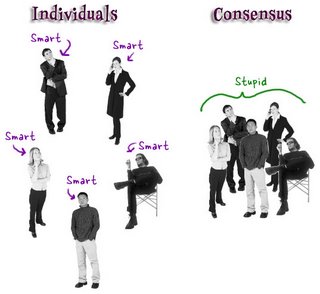Every week you will be expected to post at least two comments to this blog. Feel free to post your own ideas or comment on mine. All posts must be relevant to class discussions and assignments. Please mind your manners and use this spot for interesting discourse. Have fun this last semester of your senior year!
Thursday, April 27, 2006
End of the week...
Since you have to turn in your senior wills this week, let's add some wills to the blog. As always, blog responsibly! If you think I might not post it, don't bother writing it.
Me first...
I will my first period class the freedom to lighten up and not sweat the small stuff (except for Jack and Kevin... any lighter and they might not survive). Oh, and a few alarm clocks would be nice to help out Joanne, Ben, and Chris.
I will my third period class the ability to do things without complaining (is it possible Elliot, Lee, Cole, Drew?), squealing, or using the terms "stellar" or "careered". Also, the ability to use better judgment in all decisions... all decisions.
I will my fifth period class a few stress-free moments when you guys are not doing one of your ten thousand responsibilities (playing in a band, student government, multiple sports, organizing functions, church trips, etc....). By the way, you don't have to be so darn good at EVERYTHING. You are giving me a complex. Oh, and quit being so tall!
I will my sixth period class.... ummmmmm...... well...... the possibility of graduation..... No, seriously. That is it. Just don't drive me or the rest of the class crazy in the next few weeks and I am sure you will make it in your choice career of minister, cheerleading coach, band director, counselor, masseuse, millionaire tycoon, broadcasting genius, outdoor guide, soccer mom, dry-skinned powerlifter, obscure scientific idiot savant, composer, peach farmer, or swimsuit model.
It's all in good fun. Hopefully all of you will be able to blog more when the server comes back up next week. Have a great weekend. It is freakishly early in the AM for me to be trying to write a blog!
Wednesday, April 26, 2006
Then and now...
Tuesday, April 25, 2006
Check it out
Go check out the wikispace to find the following:
- Senior Memory Book handout and rubric
- Senior Video Rubric
- Dystopian Novel Radio Show requirements and rubric
Dystopian Societies

- Brave New World was written in 1931 prior to the war and the spread of Communism.
- 1984 was written in 1947 post-war after the world had seen what the Nazi leaders could do.
- The Handmaid's Tale was written in 1986 after the "sexual revolution" and during the rise of ultra conservative world leaders.
Monday, April 24, 2006
Blog Challenge
The challenge is to write the best "Fib" (poem that fulfills the Fibonacci mathematical sequence). For more information on this phenomenon that is sweeping the blog world, see the following sites and articles:
In short, the poem must fulfill the syllable requirement set up by this pattern: (If you have read The DaVinci Code, this sequence may be familiar.)
The Fibonacci numbers are the sequence of numbers
| (1) |
with ![]() . As a result of the definition (?), it is conventional to define
. As a result of the definition (?), it is conventional to define ![]() .
.
The Fibonacci numbers for ![]() , 2, ... are 1, 1, 2, 3, 5, 8, 13, 21, ... (Sloane's A000045).
, 2, ... are 1, 1, 2, 3, 5, 8, 13, 21, ... (Sloane's A000045).
An example from the NY Times article:
(1)Blogs
(1)spread
(2)gossip
(3)and rumor
(5)But how about a
(8)Rare, geeky form of poetry?
Thursday, April 20, 2006
Old School
Write the title of your book and write what kinds of segments or ideas you think might work for that book in a radio broadcast. Think about the world of the book including the characters, government, media or lack of, music, values, priorities, news, etc.
Ex. The Handmaid's Tale
- religious music
- weather segment
- interview with Angels regarding their position and training they receive...
Wednesday, April 19, 2006
Motivation...or "Second Semester Seniors '06!!!"
- “I would much rather have regrets about not doing what people said, than regretting not doing what my heart led me to and wondering what life had been like if I'd just been myself.”
Brittany Renée quotes (English Author and Dancer, b.1986) - “Be who you are and say what you feel, because those who mind don't matter, and those who matter don't mind.”
Dr. Seuss quotes (American Writer and Cartoonist best known for his collection of children's books. 1904-1991) - “People who are unable to motivate themselves must be content with mediocrity, no matter how impressive their other talents.”
Andrew Carnegie quotes (Scottish born American Industrialist and Philanthropist. 1835-1919) - “Success is not final, failure is not fatal: it is the courage to continue that counts.”
Winston Churchill quotes (British Orator, Author and Prime Minister during World War II. 1874-1965)
Monday, April 17, 2006
Theme song for life
Ex. "I Am"- Nicole Nordeman
Lyrics:
Only sixteen, life is so mean
What kind of curfew is at 10 pm?
You saw my mistakes and watched my heart break
Heard when I swore I'd never love again
When I was weak, unable to speak, still I could call you by name
And I said Heartache Healer, Secret keeper, be my best Friend
You said, I am.
The winds of change and circumstance
Blow in and all around us
So we find a foothold that's familiar.
And bless the moments that we feel you nearer.
Friday, April 14, 2006
Group mentality

Literature circles work under the concept that "None of us is smarter than all of us". Like many utopias, that ideal is good on paper. Collaboration cannot be bad, right? In our very collaborative world of technology where the computer not only allows you to be a consumer but encourages you to be a producer (blogs, wikipedia, web pages), is that always true?
I am an avid reader of a blog called Creating Passionate Users written by several authors. The most prolific writer on that blog, Kathy Sierra-game developer and software creator, wrote something very profound which reflected on her experience at a conference where she heard James Surowiecki, author of The Wisdom of Crowds. Kathy writes that she believes that groups are collectively dumber than individuals (see her creative image on this post). Read her post and then reflect on your thoughts about "groupwork":
He started with a few thoughts on how ants (and so many other creatures) are quite simple and stupid, but that their intelligence and complexity grows with the number of interactions between them. More ant interaction equals more sophisticated behavior. It's similar to flocking behavior, of course, where birds follow very simple rules but complex behavior emerges.
And that's all great and intuitive... until you get to humans. Humans, he said, demonstrate the opposite principle: more interactions equals dumber behavior. When we come together and interact as a group seeking consensus, we lose sophistication and intelligence. Ants get smarter while we get dumber.
So how does this track with the name of his book?
Where I had it wrong is that his book's premise (wisdom of crowds) comes with qualifiers.
The wisdom of crowds comes not from the consensus decision of the group, but from the aggregation of the ideas/thoughts/decisions of each individual in the group.
At its simplest form, it means that if you take a bunch of people and ask them (as individuals) to answer a question, the average of each of those individual answers will likely be better than if the group works together to come up with a single answer. And he has a ton of real examples (but you'll just have to read the book for them ; )
Wednesday, April 12, 2006
Unwritten rules
We have all taken vacations with our family or with friends. It may not have been to an exotic location, but anywhere but home is often enough to call it a vacation. Answer two questions:
- Where was your favorite vacation?
- Were there any family guidelines, plans, or unwritten rules regarding your time away that you can share?
Ex. 1. Gatlinburg when I was 8.
2. My mom would not allow us to sleep past 8, and I was not allowed to buy food at gas stations (we brought our own snacks in the car)
Tuesday, April 11, 2006
The perfect world...

A dystopian society according to Wikipedia is...
A dystopia is a fictional society that is usually seen as the antithesis of a utopia.
A dystopia is usually characterized by an authoritarian or totalitarian form of government, or some other kind of oppressive social control.
In 1984, Brave New World, and The Handmaid's Tale we will be looking at dystopian societies. Since we will be discussing the good and the bad of these societies as well as our own, I want to hear your opinion. If you were in charge and you could change some things to make America the perfect country, what would you change? What are some laws, practices, values, attitudes, people, or places that you would work to change to make our society better?
Saturday, April 08, 2006
Extended metaphor
- Graduation
- ________ class (your favorite class in junior high)
- High School
- Activity of your choice from high school
Wednesday, April 05, 2006
Reflection

“Do not dwell in the past, do not dream of the future, concentrate the mind on the present moment.”
Buddha
“The past is behind, learn from it.The future is ahead, prepare for it.The present is here, live it.”
Thomas S. Monson
What part does reflection play in personal growth? Does it play a part or is it just dwelling on the past?
Tuesday, April 04, 2006
Romantic poets
How do you express yourself? What would you say is your best mode of expression? Explain why you chose that forum?
Monday, April 03, 2006
Frankie- Isn't that the monster's name?
 book at sometime and see what was going on. As we come to a close on this novel, weigh in on one of the following questions. Feel free to Google it and find intelligent answers. Give some good reasons that make me believe you have some knowledge about the book. Be sure to include the number of the question you choose.
book at sometime and see what was going on. As we come to a close on this novel, weigh in on one of the following questions. Feel free to Google it and find intelligent answers. Give some good reasons that make me believe you have some knowledge about the book. Be sure to include the number of the question you choose.1. Compare the novel to a Greek tragedy, especially as it develops the themes of ambition, overreaching, hubris ("overweening pride"). Which characters display these "epic" flaws?
2. In classical and neoclassical doctrine, the "greatest of all contests" was the struggle of reason to control passion. In the nineteenth century, passion began to rise in esteem against reason. Feelings were more important. Yet the contest seems to continue. What elements of that struggle do you find in the novel? The characters of Victor and the monster are especially relevant to look at.
3. "Mary Shelley in Frankenstein clearly comes down on the side of nurture in the Nature-versus-Nurture controversy." Attack or defend.
4. "Victor Frankenstein and the monster share the same personality. Like father, like son." Attack or defend.
Questions from Harris, Robert. Virtual Salt. "Ideas for Analyzing Frankenstein." Version Date: June 18, 2000
Sunday, April 02, 2006
What do you think?
According to a paper on Blogging in higher education:
In addition to commenting on the advantages of using a tool that serves as an online journal encouraging personal reflection, and as a means of encouraging collaboration through the sharing of links to resources and up to date information, Oravec (2002, p. 618) observes that the blog has many dimensions that are suited to students' 'unique voices', empowering them, and encouraging them to become more critically analytical in their thinking. The reason, simply, is that in order to develop and sustain a clear and confident voice of one's own, one has to carefully formulate and stand by one's opinions. Writing a blog assists here because it forces a student to confront their own opinions and contemplate how their views might be interpreted and reflected upon by others (Mortensen & Walker, 2002, cited in Lamshed, Berry & Armstrong, 2002).
(Williams, Jeremy and Joanne Jacobs. "Exploring the use of blogs as learning spaces in the higher education sector." Australasian Journal of Educational Technology 2004, 20(2), 232-247.)
I feel that you have risen to the challenge and provided very interesting discussion here. The purist blogger allows for students to creat the posts. Currently I create the posts or prompts and you comment. I would like to provide some freedom for certain people or classes to provide the posts for our class. This would involve giving students within a particular class "scribe" priviledges. Basically, you would think of the prompt/post and create it on the blog.
What do you think? Is that something you would be interested in?